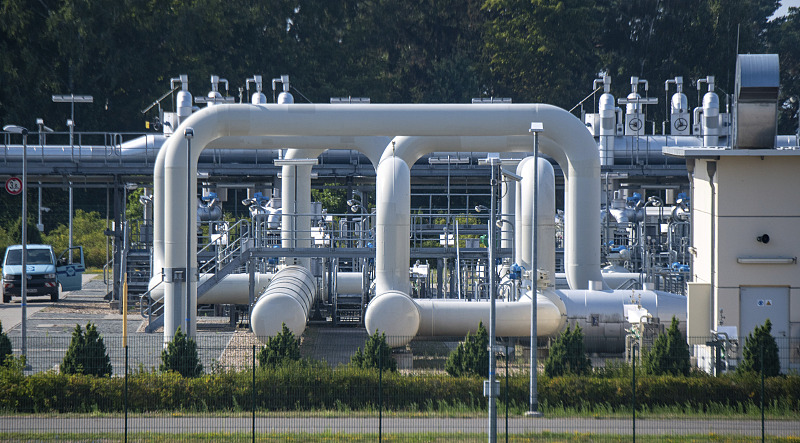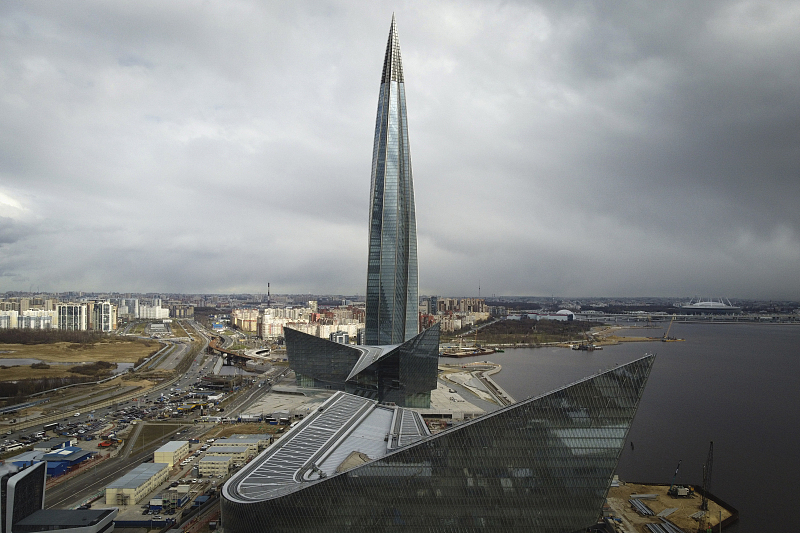
The Nord Stream 1 Baltic Sea pipeline and the transfer station of the OPAL gas pipeline, the Baltic Sea Pipeline Link, in Lubmin, Germany, July 20, 2022. /CFP
The Nord Stream 1 Baltic Sea pipeline and the transfer station of the OPAL gas pipeline, the Baltic Sea Pipeline Link, in Lubmin, Germany, July 20, 2022. /CFP
Editor's note: Bobby Naderi is a London-based journalist, guest contributor in print, radio and television, and a documentary filmmaker. The article reflects the author's opinions, and not necessarily the views of CGTN.
Moscow has seemingly warned it will not turn on Europe's main gas pipeline until the "collective West" lifts its financial sanctions against Russia.
The move follows the Nord Stream 1 pipeline allegedly shutting down for "maintenance," but reports from Interfax indicate Moscow will not be turning the gas back on until demands are met. Russian President Vladimir Putin's spokesman, Dmitry Peskov, says the shutdown is due to Western sanctions against Moscow.
Amid the speculation, it seems so obvious that financial and economic sanctions on Russia have brought hell and high water to Europe. The collective punishment of all Russians, be they pro or anti-Putin, has also failed to persuade the Kremlin to modify its behavior. The energy-rich country is not fragile, and Russia changing its policy over Ukraine or NATO is only a speculative possibility.
Collective self-delusion
Western leaders and pundits would like us to believe that the written rules of engagement in Ukraine may never change, and that Europe can – and must – win the energy war. They admit victory will be costly, but "the EU has to free itself from Russia's chokehold," and must resist "Putin's blackmail."
That's just a fool's rant as these are just distractions rather than guideposts. Try to take this in for a moment. Sharply rising energy prices have already led to high inflation across Europe. There are signs and credible reports that the EU cannot endure a winter without Russian gas. No one should ever ignore the ongoing disruption to industrial activity, nor the impact of soaring energy prices on poorer households.
Ukrainian President Volodymyr Zelenskyy recently said the EU may deal with an energy crisis, and told Europeans to expect a difficult winter. Although Gazprom plans to provide Europe with 42.4 million cubic meters of gas, winter is still coming and will be harsh. This is while there's virtually no way to escape a Europe-wide recession. Many economists and business leaders consider it likely.
Following Peskov's statements, Europe's gas futures markets showed significant pain during trading sessions. This could be not just a present reality, but the EU's future for untold months to come. It's worthwhile to enumerate that this makes the sanctions doctrine a short-sighted and self-defeating shell game – subject to no effective oversight by anyone other than its own architects.
In the continent itself, the architects of sanctions have produced more anarchy than order, more energy crises than tranquility, and more blowbacks than market stability. The world community is in the know that this is not the answer to Europe's hardships. It is a galling position to pretend financial and economic sanctions can eventually provide one.
In such a context, no mainstream media has bothered to serve the public much better by focusing on what's really going on behind the scenes of the world’s most popular reality show – the jingoistic bombast by Washington and Brussels. In most cases, the truth is little more than a footnote in the news. The idea is to try to make sure sanctions-friendly politicians capture the headlines and are top of the news.

A view of the business tower Lakhta Centre, the headquarters of Russian gas monopoly Gazprom in St. Petersburg, Russia, April 27, 2022. /CFP
A view of the business tower Lakhta Centre, the headquarters of Russian gas monopoly Gazprom in St. Petersburg, Russia, April 27, 2022. /CFP
An uneasy path
The global and the local in today's world are virtually indistinguishable. Face it, there are compelling enough reasons for Russia, Ukraine and the related powers to conclude an uneasy peace. The endless superpower struggle for dominance over Eurasia plus an increasingly militarized commitment to Ukraine have led to economic turmoil and staggering increases in the price of basic foods across Europe and faraway lands.
The one thing that all parties can agree on is that the strategy of endless hostility amid a deepening energy crisis has come with an expensive price tag. The hard and bitter way ahead is a return to negotiations, even if there's little guarantee that it will resolve any of the issues that brought them into the current conflict.
Western powers can rely on prohibitive sanctions and arms transfers as a preferred policy and in a staggering fashion, but it is the European people and companies that will continue to feel the pinch, leading many to wonder whether "the most impactful, coordinated, and wide-ranging economic restrictions in history" has what it takes to fatally cripple Russia's economy. In retrospect, Russia has continued to sell oil and gas. Driving business to non-EU markets has been the biggest escape clause of collective self-delusion in the West.
The Western alliance needs not go wrong in its efforts to end the devastating, globally disruptive conflict in Ukraine. Matters need not end there. From a pragmatic perspective, what the alliance needs is keeping the focus solely on how it can slow the carnage and avoid a European recession caused by banning Russian gas.
It's about time to figure out diplomatic responses that are not military or financial, from economic sanctions and trade embargoes to the confiscation of Russian assets and the increasingly massive shipment of arms to the embattled Ukrainians.
(If you want to contribute and have specific expertise, please contact us at opinions@cgtn.com. Follow @thouse_opinions on Twitter to discover the latest commentaries on CGTN Opinion Section.)

